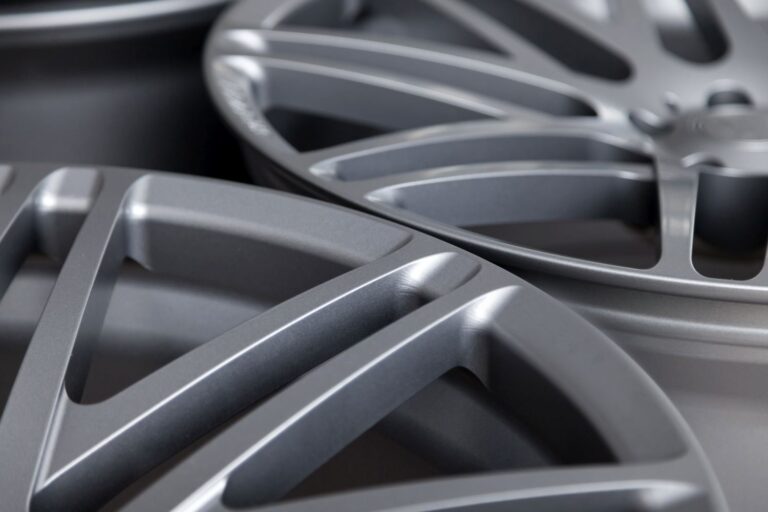- 24 September 2024
- 4 min read
How much cost refurbishing alloy wheels?

Table of contents
What is alloy wheel refurbishment?
Alloy wheel refurbishment is the process of restoring damaged or worn alloy wheels to their original condition or improving their appearance. This service addresses common issues like scuffs, scratches, corrosion, and fading from regular use or exposure to the elements. The refurbishment process typically includes cleaning, repairing any damage, and repaint of alloy wheels or powder-coating to give them a fresh finish. Depending on the level of damage, wheels can undergo cosmetic touch-ups, full reconditioning, or even be straightened if bent. Refurbishing alloy wheels not only enhances the car’s appearance but also improves wheel longevity and performance.
Factors influencing the cost of refurbishing alloy wheels
Several factors influence the cost of refurbishing alloy wheels. The size of the wheels affects pricing, with larger wheels costing more. The type of damage, such as scuffs, scratches, or corrosion, also plays a role, with more extensive repairs increasing costs. The finish type, whether it’s standard paint, powder coating, or a custom finish, impacts pricing as well. Additionally, the number of wheels being refurbished and whether a mobile service or in-shop repair is used can further affect the total cost.
Size and condition of the alloy wheels
The size and condition of alloy wheels significantly impact refurbishment costs. Larger wheels require more materials and time to restore, making them more expensive. The condition of the wheels also matters—minor scuffs and scratches are cheaper to fix, while extensive damage, such as deep scratches, corrosion, or bent rims, increases the cost. Severely damaged wheels may require more intensive repairs, adding to both labor and material expenses during refurbishment.
Type of refurbishment required
The type of refurbishment required can greatly affect the cost. A basic cosmetic touch-up, which addresses minor scuffs or scratches, is the most affordable option and typically involves sanding, repainting, and sealing. Full refurbishment, used for wheels with extensive damage like corrosion or deep scratches, involves stripping the wheel, repairing damage, and applying a new finish such as powder coating. For wheels with structural damage, like bent rims, straightening may be required, which adds to the overall cost. Additionally, custom finishes, such as diamond-cut or multi-colored designs, can also increase the price. The type of refurbishment needed depends on the extent of the damage and your desired outcome.
Average cost of alloy wheel refurbishment in the UK
In the UK, the average cost of alloy wheel refurbishment varies based on the type of service required. For a standard cosmetic touch-up, prices typically range from £50 to £70 per wheel. Full refurbishment, including fixing more significant damage and applying a new finish, can cost between £80 and £120 per wheel. For more specialized services, like diamond-cut finishes or wheel straightening, prices may reach £150 or more per wheel. Costs also depend on wheel size and the extent of the damage.
Cost comparison: DIY vs. professional refurbishing
DIY alloy wheel refurbishment is cheaper, with kits costing around £30-£50. However, it requires time, skill, and the right tools, and results may not be as durable or professional-looking. Professional refurbishing typically costs £50-£120 per wheel but ensures high-quality, long-lasting results with expert repairs and finishes. While DIY saves money upfront, professional service offers better longevity and is recommended for extensive damage or complex finishes like diamond-cut.
How to save on alloy wheel refurbishment costs
To save on alloy wheel refurbishment costs, there are several effective strategies. Here is how to fix alloy wheels and how does this process look: First, address minor damage like scuffs and scratches early, as this can prevent the need for more expensive, extensive repairs later. Mobile refurbishing services are often cheaper than taking your car to a shop and can offer convenience. If you need all four wheels refurbished, ask for a package deal or discount. Opting for standard finishes, such as powder coating, instead of custom finishes like diamond-cut, can reduce costs. DIY touch-ups with repair kits can be an option for minor damage, though professional service is recommended for more severe issues. Additionally, regular cleaning and maintenance can prolong the life of your wheels, reducing the frequency of refurbishments and keeping long-term costs lower.